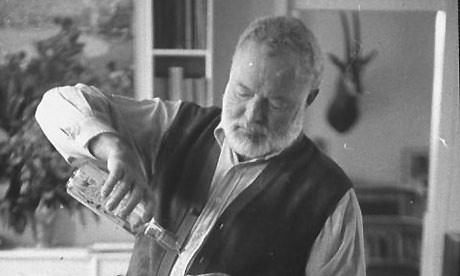This long Memorial Day week I've been in South Florida celebrating the 50th wedding anniversary of my in-laws. The plan was to head to Key West with David's brother, his partner, and the celebrating couple.
Key West! Excitedly, I began to pick out the perfect books to take. And I eagerly planned a visit to the Hemingway Museum, with its cat drinking fountain made out of a urinal from Sloppy Joe's bar.
At the last minute, our trip plans fell through. We instead are staying at my in-law's house, about an hour north of Miami. I'm afraid no great literature was born in this land of retirees from New York, faux-Italian gated housing developments for "active adults" in Disney clothes, lots of great bagel places, and multicolored lawn statuary in varying scales. "In Fair Verona FL where we lay our scene..." The natives here don't write. They watch television repeats and go out to eat at 4:30 pm. (Do you sense that I am a bitter and disappointed person?) I definitely need a little of whatever Hemingway is pouring in the picture above. And a good book.
* * *

I know they tell you no man is an island--but what do you know: this man IS an island. The trajectory of the book follows the main character as he becomes completely cut off from his emotional attachments. Thomas Hudson becomes lonelier and more internal as each page passes.
Islands in the Stream was published posthumously. The smooth, connected narratives that appear in the other Heminway novels are not here. Instead of having Hemingway's final draft, we have three stories assembled by his last wife and his publisher. The three sections trace the experiences Thomas Hudson has in Bimini, in Cuba, and on a gun boat fighting Germans off the SE coast during World War II. Although they do not weave together particularly well, the disconnect between the stories is surprisingly effective--perhaps because they are separated by events that create a disconnect for the character. (Tomorrow I'll talk a bit more about what those disconnects are, but I'll keep today's post free of details some of you might construe as spoilers.)
The first section chronicles Thomas Hudson's life on his island in the Bahamas. Hudson has created for himself a regimented and productive life, but he lets go when his three sons come to visit him for the summer and makes connections with them instead. The relationships between the boys and their father are beautifully portrayed. They tease each other, laugh together, appreciate each other's beauty and strength, and learn to grow together. The humor comes out loud and clear--not something I expected from Hemingway. This section strikes me as most polished; it is a well-organized narrative told in fluid prose. I find it both the most accessible and also the most exciting.
The second section takes us to Cuba. Although I struggled a little with the incessant talk about cats and gin and fishing and more gin, I must say this section made me thirsty. Here we are introduced to Honest Lil, a character I came to love even though I have no idea why she is in the book. Honest Lil treads perilously close to being a caricature, but Hemingway pulls off his portrait without quite crossing that line. The other female character in the book is in part two. Hudson briefly reconciles with his first wife at the end of the section, but their love for each other does not seem to be enough to make up for the friction between them.
The third section is by far the weakest in my opinion and almost seems to just peter away. Thomas Hudson has been utterly submerged in depression and grief, but at the same time he is almost completely successful in smothering his emotions. Instead of the heavy doses of gin that got him through the second section, he now turns to duty. The way he finds to confront his demons is by committing to do the job that he is responsible to do--whether or not he cares about it, and whether or not he risks his life.
I fall hard for characters who make an effort to grow and change during the course of a book. (I fall hard for real people who make that kind of effort in life, too.) Thomas Hudson tries to do the right thing, to be good, in different ways throughout the novel. In the first section, we see him try to be a good father and unite with his boys. In the second, he tries to be a good lover and unite with his ex-wife. And in the third, he tries to serve his country and his crew. Hemingway is playing off characterizations that we've seen as early as Homer's Iliad. But what is uniquely modern, I think, is that although Thomas Hudson tries to turn things right, his attempts to be good all end in failure. Instead of growth at the end, we see him shutting down.
Back to Hemingway tomorrow, then on to Sappho on Monday.

No comments:
Post a Comment